SAFL In the News
Read about SAFL research and researchers featured in the media.
Looking for patterns in forested floodplains
Posted
The question Josie wants to answer is how wood moves through a floodplain.
Main Channel News
Posted
A new project in SAFL’s largest flume seeks to test prototypes for a “sediment transport” system that could continuously move sand past hydropower dams.

Amy Tinklenberg Receives the 2023 Roger E.A. Arndt Fellowship
Posted
This year, SAFL graduate student Amy Tinklenberg received the Roger E.A. Arndt Fellowship Award for her work in fluid dynamics.
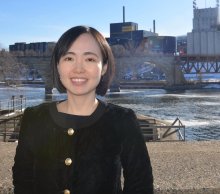
Judy Yang Receives NSF CAREER Award
Posted
Judy Yang is an Assistant Professor in the Department of Civil, Environmental, and Geo- Engineering and St. Anthony Falls Laboratory at the University of Minnesota. Her research in water resources focuses on transport of fluids, particles, bacteria, and chemicals in the environment. She received a prestigious CAREER Award from the National Science Foundation (NSF), an award given to outstanding junior faculty who exemplify the role of teacher-scholar, excelling at and integrating both research and education.
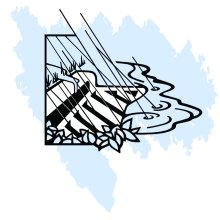
The Minnesota Stormwater Seminar Series is back in-person!
Posted
After 2.5 years, the University of Minnesota’s Stormwater Seminar Series is back in-person at the St. Anthony Falls Laboratory! Known for bringing the latest stormwater research to practitioners through bi-monthly talks by experts and interdisciplinary panel discussions, the Minnesota Stormwater Series has been operating virtually since March 2020.

SAFL’s Judy Yang and Miki Hondzo Awarded LCCMR Grant to Tackle Harmful Algal Blooms in Minnesota
Posted
Judy Yang, SAFL Faculty and Assistant Professor of Civil, Environmental, and Geo- Engineering, has recently been awarded a 326K grant from the Legislative-Citizen Commission on Minnesota Resources (LCCMR) for a project titled “Mitigating Cyanobacterial Blooms and Toxins Using Clay-Algae Flocculation.” Alongside Miki Hondzo, SAFL Faculty, Professor of Civil, Environmental, and Geo- Engineering and co-PI on the project, and other partners, Professor Yang will investigate solutions to excessive algae growth in Minnesota’s lakes and rivers.
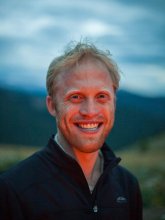
Far-reaching Lake Superior Basin project receives NSF grant
Posted
An interdisciplinary group of experts recently received a 2.8 million dollar National Science Foundation Frontier Research in Earth Sciences grant to delve into the formation and evolution of the Lake Superior basin. The unique glacial and geological history of the Lake Superior region offers the team of nine lead scientists, spread across five universities, a "natural experiment" to study the structure of Earth's crust and mantle, the behavior of outlet glaciers from ice sheets, river erosion, and lake- and sea-level change.
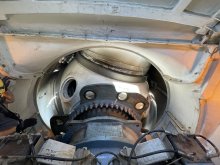
SAFL partners with WEST & TNO on system to detect bird and bat collisions at wind turbines
Posted
In early July, representatives from St. Anthony Falls Laboratory (SAFL), Western EcoSystems Technology, Inc. (WEST) and the Netherlands Organization for Applied Scientific Research (TNO) were busy installing vibration sensors and cameras on the wind turbine at the Eolos Wind Energy Research Station at UMore Park. “We’re evaluating and refining a multi-sensor system developed by TNO to detect bat and bird collisions with wind turbine blades,” explains Dr. Jennifer Stucker, senior research biologist for WEST who manages the project, titled A Multi-Sensor Approach for Measuring Bird and Bat Collisions with Offshore Wind Turbines.
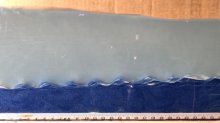
Coming Full Circle - Harnessing the power of weathering to remove excess CO2 from the atmosphere
Posted
A group of researchers led by Sara Polanco, a University of Minnesota alumna, are conducting a series of flume tank experiments at the St. Anthony Falls Laboratory to understand how olivine-supplemented sediments will respond to wave action when deployed into coastal settings.
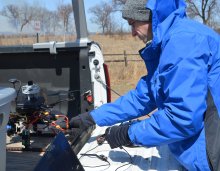
SAFL Faculty and Researchers Develop Tool to Measure Particle Transport of Wildfire Soot
Posted
“Gaining a better understanding of how aerosol particles are dispersed downwind from wildfire smoke has potentially big implications for public health,” explains SAFL postdoctoral researcher Nate Bristow. “Aerosols from wildfires also influence radiative forcing, which impacts how the atmosphere is trapping heat. As we are better able to measure and characterize the morphology of these aerosols during transport, including how they may aggregate together and change in size, we can work towards developing predictive models that more accurately incorporate the feedbacks of these particles on the climate.”
